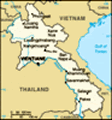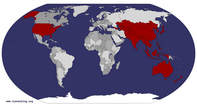Advertisement
Published: April 25th 2007
(Apologies in advance for an EXTREMELY lengthy blog).
Laos, in many ways, is the climax of our trip. Far and away it is the most difficult to journey through, and yet, like the most athletic effort, it leaves you deeply satisfied and yearning for more. Thankfully (sadly) we have two weeks remaining.
If you were to imagine turn-of-the-20th-century Asia, packed with colonialists and imperialists attempting to civilize a heathen people, you might imagine Laos, the way it is today. They love to accep US dollar as payment, and love to use that as an excuse to make another dollar or two. The lady who sold us our (civilized) minivan trip from Houy Xai to Lam Nam Tha thought that she was entitled to triple prices just for being listed in the backpackers' bible. Although perhaps her command of English - a rare commodity in Laos - justified it.
In trying to describe Laos, you run through a standard travelers' vocabulary: sleepy, awakening, rustic, balance, tension, timeless, authentic. Laos is both none of these things and all of them at once. The sense of being on another planet, in another universe, in another era, is pervasice and as
undeniable as though a 50-m tall, 5-m thick cement blockade were erected around the country to keep any changes away. The only way I can think of to eludicate this for you is to tell you a bit about our experiences here so far.
We made friends with the other passengers heading to Lam Nam Tha in our minibus. Together we made a group large eonuigh to sign up for a 3-day hike to serveral hill tribe villages in the Nam Ha Protected Area, a place just starting to be developed for ecotourism. Day Two was the most memorable day. We started off in the morning with a quick ascent to the top of a hill, with breathtaking views of emerging from between clusters of tall bamboo. The mountains, ceaselessly present in Laos, appear and disappear into the murky distance as though pockets of morning mist hung too heavily up on their peaks. However as quick sniff brings the scent of freshly burned teak - ash to the lungs will result, two days later, in a dry cough, congested head, and shortness of breath for both Kate & I. The hill tribes use a devastatingly efficient traditional means of
clearing the land: burn, burn, burn. As I mentioned to Kate, it's as controlled as an unattended forest fire can be. It remains to be seen whether the blanket bombing the US carried out was more effective.
Onward, we make our way into the jungle. Here, our trail is frequently nearly invisible. Red, claylike mud developed from last night's rain, and the shade of the overhanging vines hasn't quite washed it away. Bic, one of our guides, gets very excited when he notices a patch of torn bark on a fruit-bearing tree. A bear climbed up this, he explains, and sure enough there are the sets of deep puncture wounds climbing up the trunk. We hope he also climbed down and ran away, long ago. It also explains why our village guide is carrying a rifle.
Our trail continues through a bamboo grove, where it beomces little more than recently trampled fallen bamboo leaves. Affectionately I call this "bamboo snow", for it makes and off-white blanket covering the ground, and we must plow through the shallow layer as though rustling a fresh path into frozen snow. The only reason these trails exists is because hill tribes use them
to go from one village to the next. Their zig-zag network is as dense as their multicolored embroidery, and I am grateful for the local guide with us who surely has trod these trails daily from the time he could walk. The hill tribe people have great endurance. We often see them on the road, carrying a load of sticks, water, or rice on their back, the women often carrying a baby. When we see them, invariably they are heading opposite to us, and are miles from the last village, and miles more to the next. I often wonder whether they expect to return before dark, or if not, do their feet know the way so well they can see for them while their eyes are blinded by the dark? The roads are only hairpin turns, uphill, and paved by dirt.
Finally our slippery descent levels off, and we notice we have arrived in an Edenic valley. Nestled cozily in the lap of gently rolling lush jungle mountains, the broken geometry of rice paddies gone to pastureland unfolds. A herd of buffalo graze alongside a burbling stream, dammed up with shiny rocks in strategic locations to create swimming, bathing,
and washing pools (for humans and animals alike). A lone shaft of sunlight breaks through the smoky sky, to shine upon a motely assembly of raised bamboo huts, thatched with leaves, and positioned in the bend of the river. The choir of angels in heavens sings joyously at the sight. No joke.
Climbing up a four-step ladder of bamboo rods, we enter the village. Here we observe life more exciting than I can possibly describe. We sat upon our porch overlooking the village for hours and we were more entertained than I can recall recently. One child, no older than two, barely waddling but brandishing a stick longer than he was tall, whacked pigs, chickens, and dogs without prejudice. He wore only a t-shirt to cover his shoulders and belly. "No fear, no trousers," quipps Gav (a minibus passenger). A three-plank bridge corssed the river nearby - well, a three-trunk bridge - and we were ceaselessly amused waiting for animals to cross it. Watching the goat, dogs, hens, and chicks and ducks all cross put our mincing foreigners' steps to shame. "I saw a three year old cross about as fast as we did," Kate offers. After seeing two
three year olds play around with an umbrella for half an hour, I wished I still had the simple imagination to be thrilled by the same object endlessly, day after day. Meanwhile, in the distant fields, two older boys were trying to see who could stay astride a goat the longest. Laughing, a group tore through the yard with a rope lasso, chasing several squaking and harrassed looking roosters. Once tied, the roosters tried to fly away - only to be dragged back to the earth rudely by their leash. On that porch, the adult community members came by, greeting us as they went about their errands and chores. Rice, firewood, dinner, paraded before us. A couple of goats conversed confusedly with Kate, who has mastered the language of bleat, and a black kitten decided that we made good company too. We were surrounded by an infinity of these moments as sun set, lengthening the shadows into darkness across the valley. Dinner fires flickered visibily in between the gaps in the slats of bamboo walls, and here and there a candle burned in an open doorway. Their houses had no windows, no toilet, no stove, no electricity, no running water. No separations; just one large room piled with blankets, clothes, baskets, and other practical necessities of survival.
I have never felt more quiet, peaceful, restful, and harmonious than in that village.
I have also never felt the return to civilization (as it were) more acutely. At teatime, we watched a young girl push around a motorized dump truck, yellow plastic toy that everyone in the US has had at one time or another, and I felt pity for her. How rich was her childhood? It lacked the unpredictable factor that quixotic animal friends lent, it lacked the depth that simplicity, necessity brought. My heart went out to her, for her future was filled with lifeless dolls, repetive videogames. She would be squeamish if she saw her dinner alive, moments before consumption. Her showers would always be hot, with clear water, in a bathroom, and she would have light after dark.
Running water has been often unpredictable or nonexistant here. There is a curfew in place to ensure that foreigners are back in their hotels by 10pm (12am in "large cities" of 10,000+ people). I have seen two ATMs, one with the sign "Testing Time" above it, neither with a Visa logo. Apparently it's not everywhere I want to be. It can, and will, take twelve hours to go 300km. You will pay as much for your room as for a tube of toothpaste, and twice more for contact solution. When you pass an open-front restaurant with blue-tiled floor and flourescent lights, your are shocked at the wealth and material success of the owners. Next door a few wooden benches surround a cement table erected in a packed dirt floor. They serve fabulous noodle soup in heaping portions for fifty cents. My personal favorite form of transport here is the "tractorbarrow" - a name I just made up. It is an exposed lawn mower motor attached by a long steering shaft to a wooden cart. It chugs along at a pace slightly faster than a pedal biker, and it's usually crowded with six or eight humans, several animals like pigs or goats, and a half a dozen bags of rice. It probably takes all day to go wherever they're headed. I wonder who owns them, and if it's a good business to be in. How much does the driver charge? Is there a timetable? Everywhere, children stop what they're doing when you arrive, and call their friends (siblings?) outside to see you too. Just as often the adults stop as well. When I grin and say "Sabai dee!" (hello), they break into wide eyed grins back, and giggle among themselves.
Advertisement
Tot: 0.102s; Tpl: 0.011s; cc: 7; qc: 43; dbt: 0.0428s; 1; m:domysql w:travelblog (10.17.0.13); sld: 1;
; mem: 1.1mb








